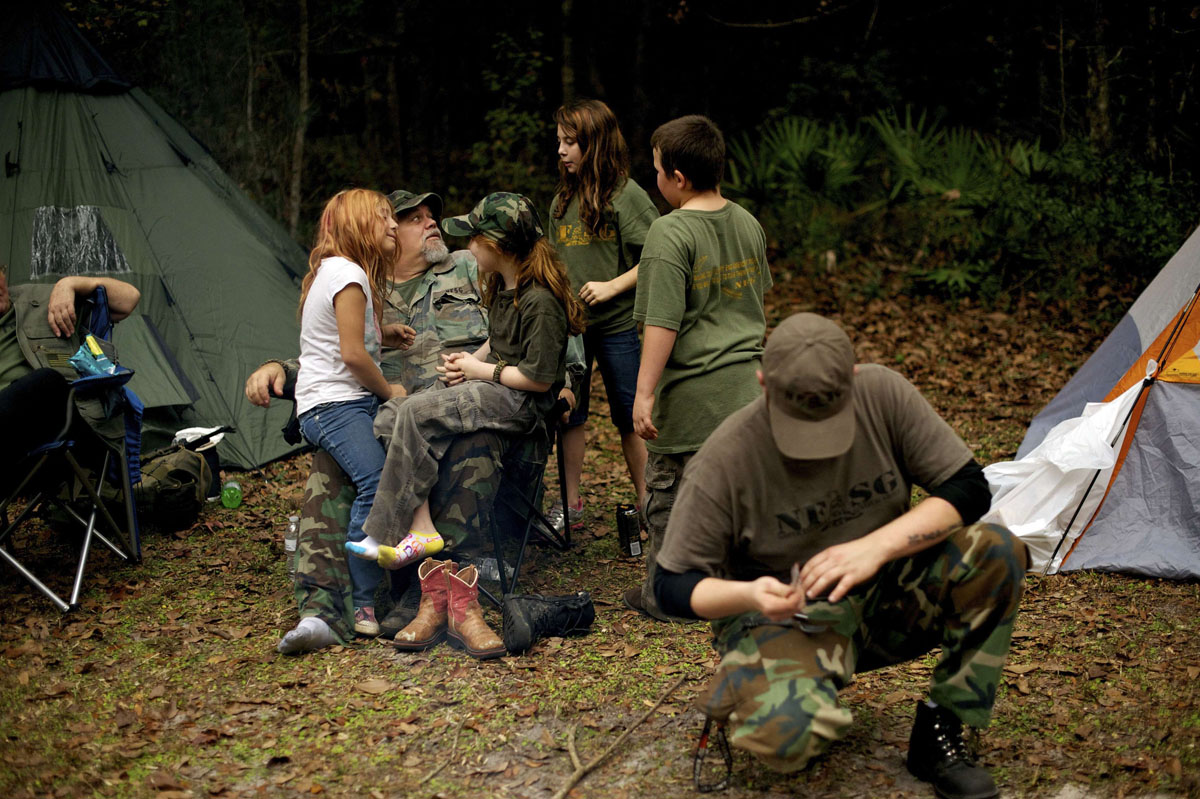Survival 101: How to organize your prepper community after SHTF
06/26/2023 / By Zoey Sky

When SHTF and society collapses, do you think your family can survive? If the answer is “no,” it’s time to talk to some of your trusted prepper friends and make detailed plans about setting up a prepper community.
Before disaster strikes, figure out who will manage certain resources to ensure that the group survives and you can rebuild society. (h/t to PreppersWill.com)
A nuclear strike orchestrated by a terrorist organization targeting major U.S. cities could quickly divert all first responders to handle the immediate and long-lasting aftermath. Anticipate many casualties, with hundreds of thousands or more people being injured or dead.
Many others could also be forced to flee their homes, which could complicate attempts to rebuild society.
If this happens, you might not be able to reach the emergency hotline and hospitals, and the police force will be too busy to maintain law and order in your city.
But as a prepper, you should be ready to deal with similar circumstances where you find yourself completely self-reliant.
You can’t survive alone, so look for trustworthy fellow preppers
Even if you’re an experienced prepper, you will eventually need the help of other people to protect your property and resources.
To increase your chance of surviving, look for like-minded preppers and make plans for a prepper community where you can protect each other and conserve your resources.
Humans are social creatures. And when SHTF, you can benefit from being a part of a mutually supportive community, especially after a large-scale disaster.
However, to establish a functioning community in a post-apocalyptic society means you must first meet some requirements. Whether you want to join an existing group or start one yourself, this guide will help you build a well-structured community.
The principles outlined can also be applied to organizing smaller-scale survival groups.
This isn’t an easy task, but preppers with shared values and goals will be able to unite, restore order, ensure mutual protection and rebuild a functioning community.
2 Things that your community will need
Before forming a prepper community, you will need two important things: leadership and organization.
It is the task of your community to choose your leader. You can nominate someone from previous leadership structures or you can choose from other sectors of society that have experienced leaders, like law enforcement or healthcare.
Your community can also try unconventional options within their own ranks.
On the other hand, larger communities will have a wider pool of potential candidates, but they will also require a stricter selection process.
Whatever method you use to select your leader, each community’s choice will be guided by your unique needs, goals and the shared ethics and values of all members.
As shown throughout history, effective leaders must be able to assemble and organize teams, delegate responsibilities and empower others to achieve objectives.
After SHTF, your group must focus on fundamental human needs like food, water, shelter, security, communications and health. Whoever is selected as the group’s leader can use these needs to guide their selection of personnel to whom responsibilities can be delegated.
Tips for selecting the leader
Ideally, the leader would prioritize individuals who are knowledgeable in their respective areas of responsibility.
When appointing someone to oversee the health of the community, it’s best to choose someone with a background in public health or a medical profession.
When selecting the leader and all directors of your community, establish a regular election schedule and implement term limits. All posts must have a predefined duration, such as a minimum of two years to a maximum of six years, so no single individual retains control indefinitely.
Finalizing the leadership team
The leadership team, which includes key personnel or directors, will depend on the size of your group and the specific challenges you could face after SHTF.
Remember that the transition from a well-structured organization to a bureaucratic system can occur quickly and unexpectedly.
With this in mind, here are the essential areas that necessitate organization, leadership and accountability to effectively manage the process of rebuilding a community after a disaster.
If your group is small, directors may need to assume responsibility for multiple areas. Additionally, certain areas of expertise may be relevant in multiple sections, highlighting the diverse organizational arrangements your group may need. (Related: Beginner’s guide to prepping: 6 Things to remember for new preppers.)
Selecting the food manager
The food manager will be responsible for the following tasks:
- Managing inventory, storage and rationing of perishable and non-perishable food supplies.
- Coordinating hunting, trapping, fishing and gathering teams to supplement your food supply.
- Overseeing agricultural tasks, such as livestock care and the cultivation of fruits and vegetables.
- Providing education and guidance to enhance the group’s understanding and skills in food-related subjects, like food preservation and foraging.
When looking for your group’s food manager, consider candidates with experience in relevant fields such as:
- Botany
- Farming
- Fishing
- Food processing and preservation
- Hunting
- Trapping
- Veterinary sciences
- Zoology
The food manager has a critical role in ensuring the community’s access to a safe food source and fostering self-sufficiency.
If you are selected as the food manager, prepare before SHTF and teach your community how to stock up on the following essential food supplies:
- Canned or dried meats
- Fats and oils
- Dried beans
- Dry milk and dairy
- Fruits
- Grains
- High-energy foods, such as preserved food, protein bars and dehydrated items
- Vegetables
- Other cooking basics
Selecting the water manager
The water manager will be responsible for tasks related to the community’s water supply and management, such as:
- Managing inventory, storage and rationing of existing clean potable water resources.
- Identifying and evaluating new, viable water sources for future use.
- Ensuring the group’s supply of potable water.
- Safely handling, accessing, using, storing and recycling greywater.
- Maintaining safe handling, storage and disposal of wastewater.
- Collaborating with the food manager on how to use greywater and wastewater for agricultural purposes.
- Educating the group to enhance their knowledge and personal skills in water management.
When looking for your group’s water manager, consider candidates with experience in relevant fields such as:
- Chemists
- Natural resource managers
- Plumbers
- Wastewater management specialists
- Water treatment and purification workers
The water manager’s duties include securing a sustainable and safe water supply for the community.
Selecting the shelter manager
The shelter manager will be responsible for tasks that include the community’s housing and infrastructure, such as:
- Overseeing construction projects of habitable structures.
- Maintaining existing habitable structures.
- Ensuring the safety and compliance of homes with the group’s minimum standards for safety and sanitation.
- Educating members to improve their knowledge and personal skills in shelter-related subjects.
When looking for your group’s shelter manager, consider candidates with experience in relevant fields such as:
- Architects
- Carpenters
- Construction contractors
- Construction vehicle and equipment operators
- Electricians
- Engineers
- Machinists
- Masons
- Repairmen
- Roofers
- Steelworkers
- Woodworkers
The shelter manager is responsible for providing safe and functional living spaces for community members.
Selecting the communications manager
The communications manager will be responsible for tasks involving internal and external communication infrastructure, including:
- Managing the construction and maintenance of infrastructure for public and mass communications.
- Keeping members updated about the group’s current status.
- Gathering and sharing updated information to the community and neighboring groups.
- Managing message traffic with external contacts, as needed.
- Overseeing traditional print communication methods if possible, like, mail and newspapers.
- Educating group members to add to their knowledge and personal skills in communication-related subjects.
When looking for your group’s communications manager, consider candidates with experience in relevant fields such as:
- Electronic and communications specialists
- HAM and long-distance radio operators and technicians
- Linemen
- Morse code specialists
The communications manager will be responsible for finding effective and reliable communication channels for the community.
Selecting the health manager
The health manager plays a crucial role in overseeing different tasks related to the well-being of the community. Their responsibilities will include different health, medical, hygiene and sanitation needs.
The health manager will also be responsible for the following tasks:
- Cultivating and gathering medicinal plants that can be used to treat various health-related issues.
- Providing comprehensive medical, dental and emotional care for members, including general veterinary care for any pets and livestock.
- Educating the group on relevant subjects to enhance their personal skills in this area.
When looking for your group’s health manager, consider candidates with experience in relevant fields such as:
- Traditional, holistic and natural medical and mental health professionals
- Animal husbandry
- Emergency medical technicians (EMTs)
- Health and sex education instructors
- Midwifery
- Pharmacy
- Search-and-rescue personnel
- Teaching
- Veterinary medicine
By appointing a responsible health manager, the community guarantees the availability of essential healthcare services even after SHTF.
Selecting the labor manager
The labor manager will help oversee trades and occupations that do not fall under the other mentioned areas of responsibility.
A community’s organizational chart can be personalized to suit the group’s unique assets and needs.
Here are examples of different trades and workers that could be overseen by the labor manager:
- Artists, musicians, entertainers and athletes that contribute to the cultural enrichment of the group.
- Childcare specialists responsible for the well-being of children within the group.
- Economists managing economic matters.
- Engineers knowledgeable in various disciplines.
- Religious clergy and leaders that provide the group with spiritual guidance and support.
- Scientists responsible for research and development.
- Transportation and logistics experts and workers managing the distribution of goods and resources.
- Vehicle and equipment technicians responsible for the upkeep and repair of the group’s machinery.
- General scholars and experts in different fields.
- General laborers responsible for different manual tasks and maintenance duties.
The labor manager has a crucial role in effectively utilizing and coordinating the unique skill sets and expertise of community members.
Selecting the security manager
The security manager will oversee the safety and protection of the community members and their property, including:
- Protecting the community and their belongings, both internally and externally.
- Defending the community against various threats.
- Carrying out law enforcement duties and managing criminal court functions, including catching, restraining, prosecuting and administering punishments to criminals.
- Educating the group to improve their knowledge and personal skills in security-related subjects.
When looking for your group’s security manager, consider candidates with experience in relevant fields such as:
- Experienced warfighters
- Firefighters
- Gunsmiths
- Law enforcement and corrections officers
- Martial artists
- Surveillance and security system experts and technicians
The security manager oversees the community’s safety and maintains law and order within the group.
Before SHTF, use these tips to establish organization within your prepper community.
Not all preppers will decide to join a community like the one outlined here, and you must accept this. Others may prefer to live autonomously, so respect their decisions and continue looking for other preppers who can contribute to your future survival community.
Watch the video below for tips on how to build a 72-hour survival bag before SHTF.
This video is from the Daily Videos channel on Brighteon.com.
More related stories:
Water, gardening, community and more: 11 Important tips for preppers.
Protect yourself against food shortage with these useful prepping practices.
Learn how to live without electricity from the Amish community.
Sources include:
Submit a correction >>
Tagged Under:
Collapse, disaster, emergency preparedness, off grid, preparedness, prepper, prepper community, prepping, prepping tips, SHTF, survival, survival group, Survival Tips, survivalist, tips
This article may contain statements that reflect the opinion of the author
RECENT NEWS & ARTICLES
COPYRIGHT © 2017 OFFGRID NEWS




















